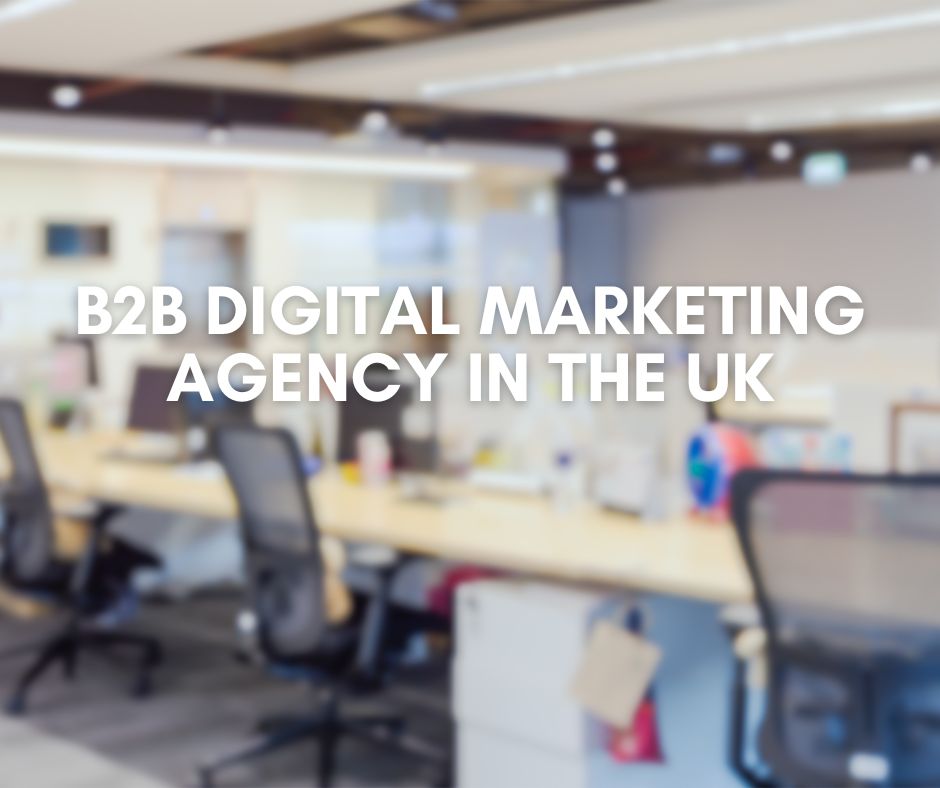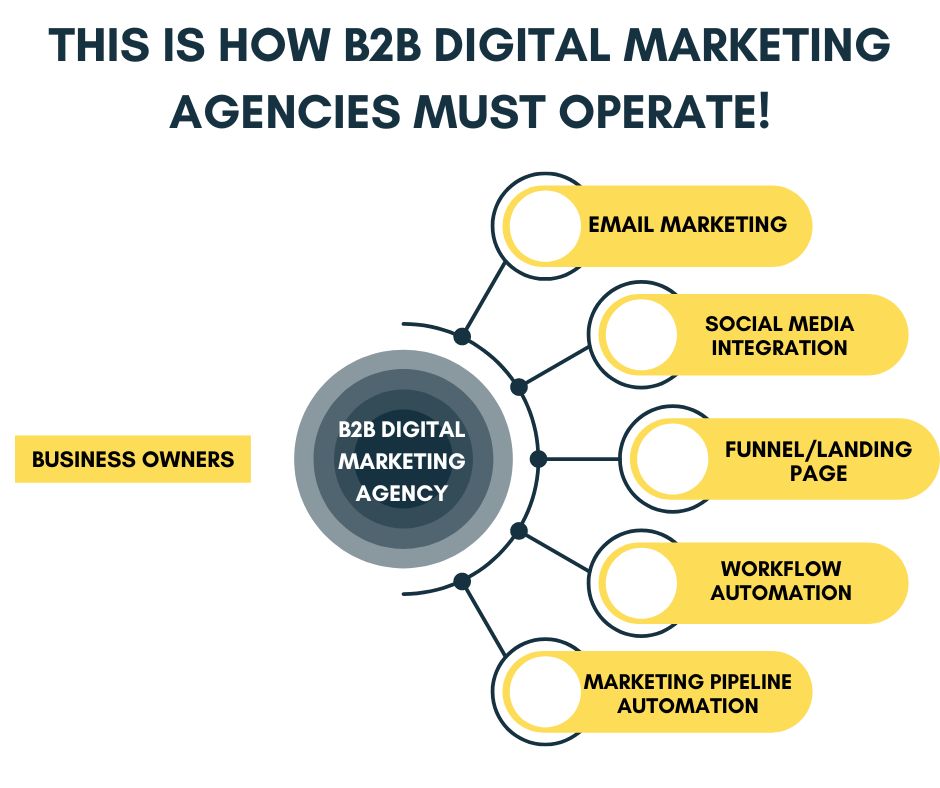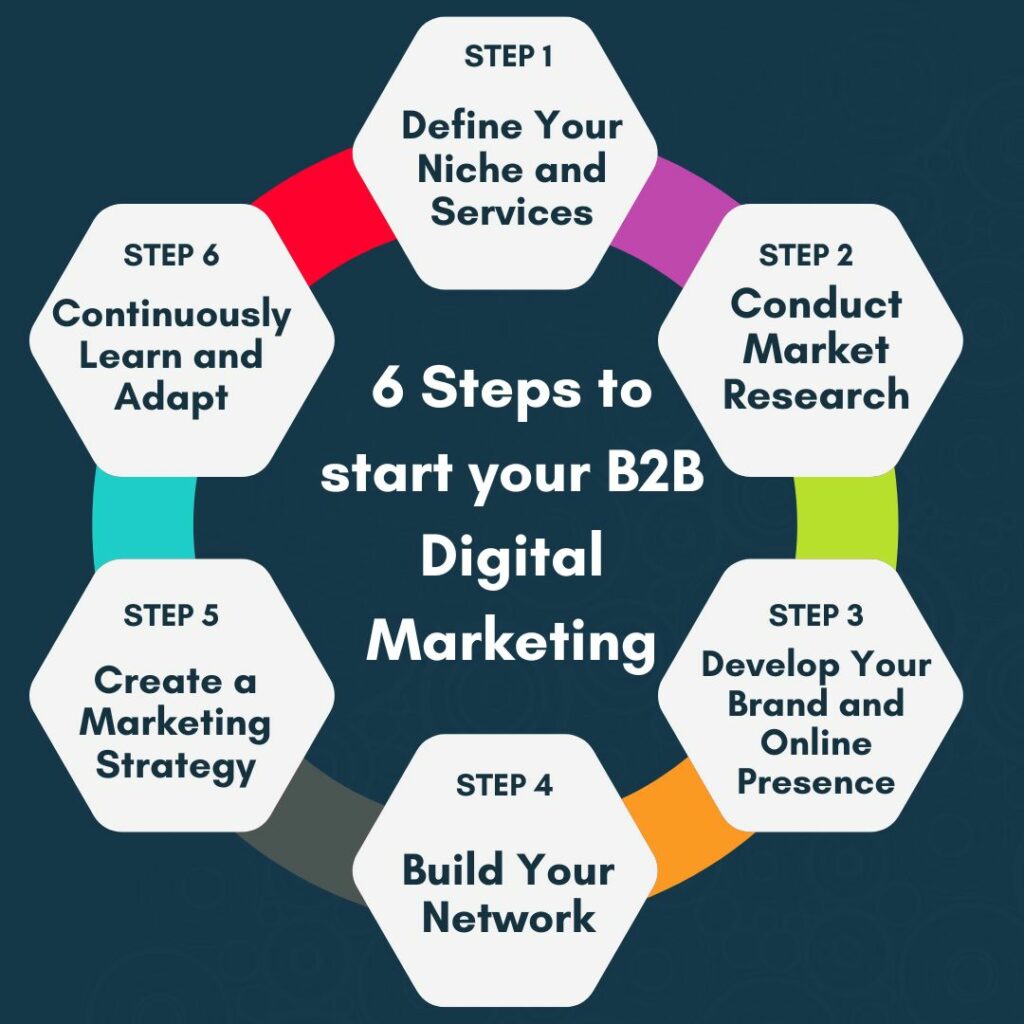Are you intrigued by the idea of owning B2B marketing agency but unsure where to begin? Looking for the right place to learn on how to start a b2b digital marketing agency in the UK.
According to the latest Marketing Spend Outlook 2021-2024, Plural predicts a substantial increase in B2B marketing expenditure in both the UK and the US within the coming three years.
That’s why, even though there are quite a lot of B2B digital marketing agencies around at the moment, we still believe it’s worth investing in this business.
Perhaps you’ve heard success stories or seen the growing demand for digital services, and you’re wondering if you could carve out your own slice of this lucrative market.
Well, you’re not alone. With the rise of online businesses and the ever-increasing importance of digital presence, the demand for specialised B2B digital marketing services is booming.
But starting your own agency can be daunting, especially if you’re new to the game.
In this blog, we’ll walk you through the essentials of starting a B2B digital marketing agency in the UK, from understanding what exactly it entails to the costs involved and whether it’s a venture worth pursuing.
We’ll explore how to start a b2b digital marketing agency in the UK, and we’ll give you some useful advice to help you begin your digital marketing journey.
So if you’re ready to turn your passion for digital marketing into a thriving business venture, keep reading.

What is a B2B digital marketing agency?
A B2B digital marketing agency is a company that helps other businesses sell their products or services to other businesses online.
Their main job is to create and put into action marketing plans that are aimed at other businesses, not individual consumers.
They do this by understanding the needs and decisions of professionals who buy things for their companies.
B2B agencies use different online methods like improving websites to show up higher in search results, running targeted adverts on platforms like Google and LinkedIn, making helpful content like blogs and articles, managing social media accounts, sending tailored emails, and using software to make marketing easier.
Who can benefit from teaming up with a B2B digital marketing agency?
Businesses, especially small ones, with limited marketing know-how and resources can find these agencies helpful.
These agencies are important because many B2B buyers look for products and services online, so having a strong digital presence is crucial.
Exactly! They assist in building an online presence and reaching the right audience.
For companies aiming to grow, b2b digital marketing agencies in the UK are great for expanding into new markets efficiently.
Also, they provide insights and manage campaigns to boost performance.
By learning how to start and run a b2b digital marketing agency in the UK, you will acquire knowledge and tools to save businesses time and money by handling your clients’ online marketing effectively.

Is creating a B2B digital marketing agency worth it?
Deciding whether to start a B2B digital marketing agency involves careful consideration of various factors.
So, aside from learning how to start a b2b digital marketing agency uk, we will also enlighten your mind if this kind of business is worth investing for.
On the positive side, there’s a notable surge in demand for digital marketing services within the B2B sector.
In 2024, it is projected that worldwide advertising expenditure will increase by 8.2% to reach a total of $1 trillion (£788 billion).
This demand stems from businesses recognising the importance of establishing an online presence.
Consequently, they are increasingly willing to invest in digital marketing strategies to achieve their goals.
Furthermore, in the business-to-business market, companies often have more money to spend compared to those selling directly to consumers. This means there could be good opportunities for people looking to enter this market.
While you’re currently learning how to start a b2b digital marketing agency in the UK, it’s also important to recognise the difficulties and downsides of setting up this agency.
There’s a lot of competition in digital marketing, especially for business-to-business services.
Big companies and freelancers already have a big piece of the market, so newbies need smart ideas to get noticed.
However, it’s actually a really good opportunity. Why?
Well, nowadays, businesses depend a lot on digital stuff to connect with their customers.
By setting up a B2B digital marketing agency, you can help these businesses figure out how to use the internet to reach more people and grow. You’d be helping businesses succeed in the online world. That’s pretty cool!
With some effort and the right approach, getting into B2B digital marketing could turn out to be a really rewarding adventure.
6 Steps you need to follow to get started!

Step 1: Define Your Niche and Services
When we talk about defining your niche, many business owners mistakenly think it means making their market smaller.
They worry it’ll limit who they can sell to and how much money they can make. Some also believe it’s a one-time decision, and they’re afraid they’ll miss out on other opportunities if they specialise.
But the truth is, defining your niche isn’t about making things smaller – it’s about focusing on what you’re good at and who you serve best.
Yes, it’s about clarity and intentionality, not about closing doors.
Before launching your agency, identify your target market and the specific services you’ll offer.
Consider focusing on a particular industry or niche within the B2B sector.
For example, you might specialise in digital marketing for technology startups or professional services firms.
What to do?
Research potential niches thoroughly to understand their needs and competition, and choose one where you can provide unique value.
Step 2: Conduct Market Research
Once you’ve defined your niche, conduct market research to gain insights into your target audience, competitors, and industry trends.
Understand the challenges and pain points faced by businesses in your niche, and tailor your services to address these needs.
Use online surveys, industry reports, and competitor analysis tools to gather valuable data and inform your business strategy.
Competitor research is often overlooked by businesses for several reasons.
Many businesses simply aren’t aware of its importance or how to carry it out effectively.
Additionally, there’s a fear among some business owners that focusing too much on competitors could make them appear insecure or like they’re copying others.
Moreover, the time and effort required for thorough competitor research can be overwhelming, particularly for smaller businesses with limited resources.
However, competitor research is crucial for understanding the market, spotting opportunities, and making informed decisions.
It helps businesses to see what others in their industry are doing well or poorly, allowing them to adapt their strategies accordingly.
Step 3: Develop Your Brand and Online Presence
Create a strong brand identity that reflects your agency’s values and expertise. This includes designing a professional logo, website, and social media profiles.
However, it’s important to note that branding is not only about the logo and visuals.
While these elements are important, branding involves much more, encompassing the entire customer experience from initial interaction to ongoing engagement.
Right, it’s very important that you convey the real value of your offered services by engaging with them.
This misconception can lead to missed opportunities and ineffective strategies, as it overlooks the significance of conveying values, emotions, and promises at every touchpoint.
Business owners should understand that branding is a continuous process of evolution and adaptation, not a static concept.
Remember this, your online presence is crucial for attracting clients and establishing credibility in the digital marketing industry.
Step 4: Build Your Network
Networking is essential for acquiring clients and building partnerships in the B2B digital marketing space.
To effectively build a network online for your B2B business, it’s important to use platforms like LinkedIn and other relevant social media sites where your target audience hangs out.
Make sure your profile is top-optimised, join groups related to your industry, and share helpful content.
Creating valuable content such as blogs, ebooks, or webinars can establish you as a trusted expert in your field.
Also, it is very effective to engage with your audience by responding to comments and questions, and collaborate with other businesses to expand your reach.
Remember to be genuine!
Focus on building relationships by offering value, sharing insights, and actively engaging with your network.
Step 5: Create a Marketing Strategy
Develop a comprehensive marketing strategy to promote your agency and attract clients.
Create a clear marketing funnel to make sure you are well aware of your client journey from acquisition to conversion.
This may include content marketing, social media marketing, email campaigns, and paid advertising.
Tailor your marketing efforts to reach decision-makers in your target industry and showcase your expertise.
To be honest, your marketing won’t work well unless you clearly show the value you offer to your target customers.
Therefore, create top-notch content that teaches, entertains, and connects with your audience to build trust and credibility.
Step 6: Continuously Learn and Adapt
The digital marketing landscape is constantly evolving, so it’s essential to stay updated on industry trends, technologies, and best practices.
Invest in ongoing learning and professional development to enhance your skills and expertise.
Be adaptable and willing to experiment with new strategies to stay ahead of the competition.
Attend workshops, webinars, and conferences, and join industry associations to stay informed and connected with other professionals in the field.


